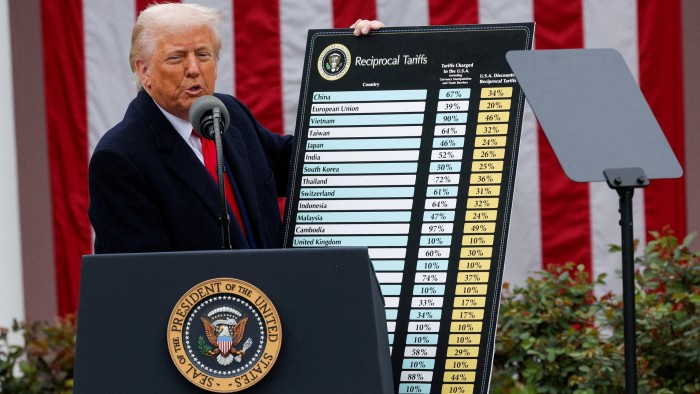Unlock the White House Watch newsletter for free
Your guide to what Trump’s second term means for Washington, business and the world
Donald Trump has suffered plenty of legal setbacks in his second term, but none quite like this one. The US Court of International Trade’s ruling this week that the president misapplied emergency economic powers legislation to impose his “liberation day” tariffs knocks out the main underpinning of his flagship policy. It also calls into question a tool Trump has repeatedly used to attempt to rule by decree: declaring a series of national emergencies. An appeals court later gave his tariff plans a reprieve pending a White House appeal. But the ruling highlights the salutary role America’s courts are playing in trying to rein in what Trump regards as his limitless powers as president.
The International Emergency Economic Powers Act, which Trump has used — as no president has before — to impose sweeping global tariffs, can be invoked only if the US faces an “unusual and extraordinary threat” to its national security, foreign policy or economy. Courts have generally shied away from judgments related to supposed issues of national security. The trade court’s ruling, however, recognises the obvious: there is no international economic emergency over US trade. Trump’s gripes over America’s balance of trade figures do not constitute a national security problem.
The appeals court might yet overturn the trade court’s ruling. If it does not, the administration could attempt to take it to the Supreme Court — though the top court, which tends to shy from clashes over presidential powers, might not accept it. There are alternative legal bases Trump could use to try to pursue his trade measures, though some could be vulnerable to similar challenges. Whatever happens, the initial ruling has dealt a serious blow to Trump’s costly and ill-founded policy, by denting the credibility of his bargaining chip in his efforts to extract more favourable trading terms from partners.
The judgment has thrown into focus, too, Trump’s use of emergencies as a basis for action. He has declared more in his first 100 days than any modern president. A supposed emergency on the US southern border was declared to justify additional militarisation; an energy emergency was the basis for boosting fossil fuel production. Such powers were intended to afford the president some leeway to act in moments of real crisis; Trump is using them to bypass Congress and rule by presidential fiat. The court judgment ought to inspire the largely supine legislature to define more tightly what counts as a national emergency.
The dozens of legal challenges that judges have issued to Trump’s executive actions amount more often to speed bumps in his path than outright roadblocks. The more he encounters, however, the more the president will confront the choice of whether to start pursuing a more nakedly authoritarian route. If his beloved tariffs plan continues to be blocked, for example, he might in theory attempt to persuade Congress to grant him the trade powers he requires to achieve his aim. Even with a Republican majority in both houses, there are enough free traders to make that outcome unlikely. The alternative is to openly defy a Supreme Court ruling, or one from a lower court that it has allowed to stand.
The White House has arguably already done so, in failing to fulfil a Supreme Court ruling that it should facilitate the return to the US of Kilmar Ábrego García, wrongly deported to an El Salvador jail. The president has argued that since Abrego Garcia is in El Salvador, he is beyond US jurisdiction. Sooner or later, Trump may choose more overtly to defy the courts. At that moment, what has been a rumbling constitutional clash will become a full-blown constitutional crisis.
